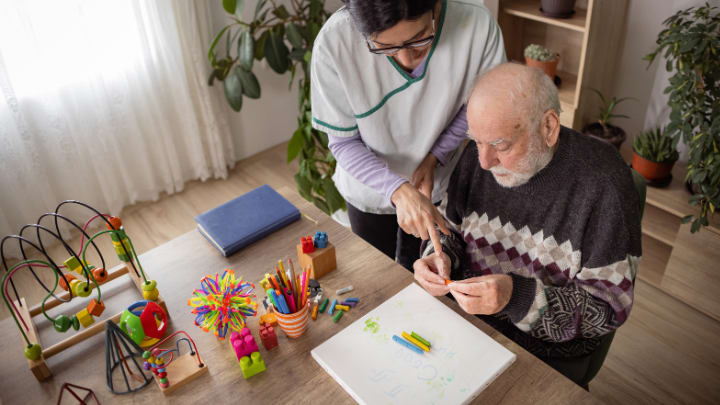Smaller communities provide better-tailored attention for Alzheimer's care in Oklahoma City—many memory care communities house over 40 residents. However, specialized centers like Iris Memory Care limit the number of residents in each building to ensure individualized care and attention. Your loved one's cognitive health and quality of life benefit from these memory care programs while preserving their dignity.
Memory Games That Stand the Test of Time
Memory games work wonders to support cognitive health. Card matching exercises are essential tools in memory care programs. Playing card games helps develop strategic thinking, memory retention and social interaction. Games like Go Fish, Bridge and Solitaire provide different levels of brain exercise that keep your mind sharp.
Pattern recognition activities make both short-term and long-term memory stronger. Your brain uses these exercises to store information from surroundings into short-term memory. Pattern Matrix games challenge players to match similar tiles that often have rotated elements. This creates a more challenging brain training experience. Quick pattern recognition relates closely to cognitive performance and helps predict upcoming patterns in many situations.
Storytelling has emerged as a powerful way to improve memory. Studies reveal that people with dementia can more easily talk about their past memories than current events. These classic games pack multiple cognitive benefits.
-
Word puzzles and card-matching activities generate new brain neurons that might slow cognitive decline.
-
Memory-matching exercises boost concentration and short-term recall.
-
Group activities are especially valuable because they encourage communication skills and build positive emotional connections.
Multi-Sensory Memory Activities
When multiple senses work together, multi-sensory activities build powerful connections in the brain and improve memory. Studies show that using senses of all types helps people remember things 226% better than single-sense methods.
Music-based memory exercises
Music has remarkable power in memory care because it activates both emotional and rhythm centers in the brain. Memory of music stays intact even in the late stages of cognitive decline. Music therapy with familiar songs from residents' youth creates bridges to long-term memories.
Singing activities help residents the most because they can improve communication skills even when verbal abilities decline. These musical sessions have worked well to reduce anxiety and depression while assisting residents to socialize more.
Tactile stimulation games
Touch-based activities help build trust and relaxation in memory care settings. These activities include:
-
Texture exploration with fabric samples
-
Hand massage sessions with aromatic lotions
-
Sorting activities using different materials
-
Sensory stimulation pillows with varied textures
These tactile activities have shown improvements in short-term and long-term memory while increasing social participation.
Aroma and memory association activities
Smell and memory have a powerful connection because the hippocampus sits next to the brain's odor-sensing region. Aroma-based activities work well as memory triggers. Research shows that six months of exposure to different fragrances at night led to better cognitive function.
Memory care programs use scent-based activities with familiar aromas from residents' past experiences. Common scents include cooking spices, garden flowers or traditional perfumes. The sense of smell maintains strong connections to emotional memories and is a great way to get results in memory care therapy.
Social Interaction Through Memory Games
Social interaction is the lifeblood of memory care therapy. Research shows that frequent social contact substantially reduces the risk of cognitive decline. Group activities create an environment where memories thrive through shared experiences.
Group memory circle activities
Group sessions encourage mental stimulation while building social bonds. Popular activities include:
-
Balloon volleyball for improving balance and reflexes
-
Karaoke sessions that trigger memory through familiar songs
-
Interactive memory circle games with shared storytelling
-
Group puzzle-solving activities
Research shows that group memory activity participants experience a 20% reduction in anxiety and depression.
Family participation exercises
Meaningful connections emerge when families spend time with their loved ones. Care centers support activities like browsing through photo albums, creating family tree posters and sharing childhood memories. Families also participate in hands-on exercises. They prepare afternoon tea or fold laundry together to maintain a comforting sense of routine.
Peer-to-peer memory games
Structured peer interactions through games boost cognitive function while strengthening social bonds. Card games like Bridge and Uno help develop strategic thinking and social skills. Board games played between ages 70 and 79 show remarkable results in reducing cognitive decline.
These social memory activities provide multiple benefits. They help improve communication skills, boost emotional well-being and maintain daily living abilities. Memory games create new neural pathways that support both cognitive and functional skills, unlike passive activities.
People who participate in brain training report handling everyday tasks better and these benefits grow with more frequent exercise. The therapeutic benefits become clearer when memory exercises combine mental and physical elements. Tai chi with memory tasks helps people sleep better while strengthening their cognitive function.
Beyond Brain Games
Places like Iris Memory Care of NW Oklahoma City show how memory games are powerful tools that improve Alzheimer's care beyond essential cognitive stimulation. Studies show these activities create lasting positive changes when combined with professional care and guidance.
Your loved one needs care that recognizes how vital memory activities are. Professional memory care centers run structured programs that blend proven games with expert supervision. To learn more about memory care programs that could help your family member, call (405) 252-8200 and speak with experienced care specialists.


